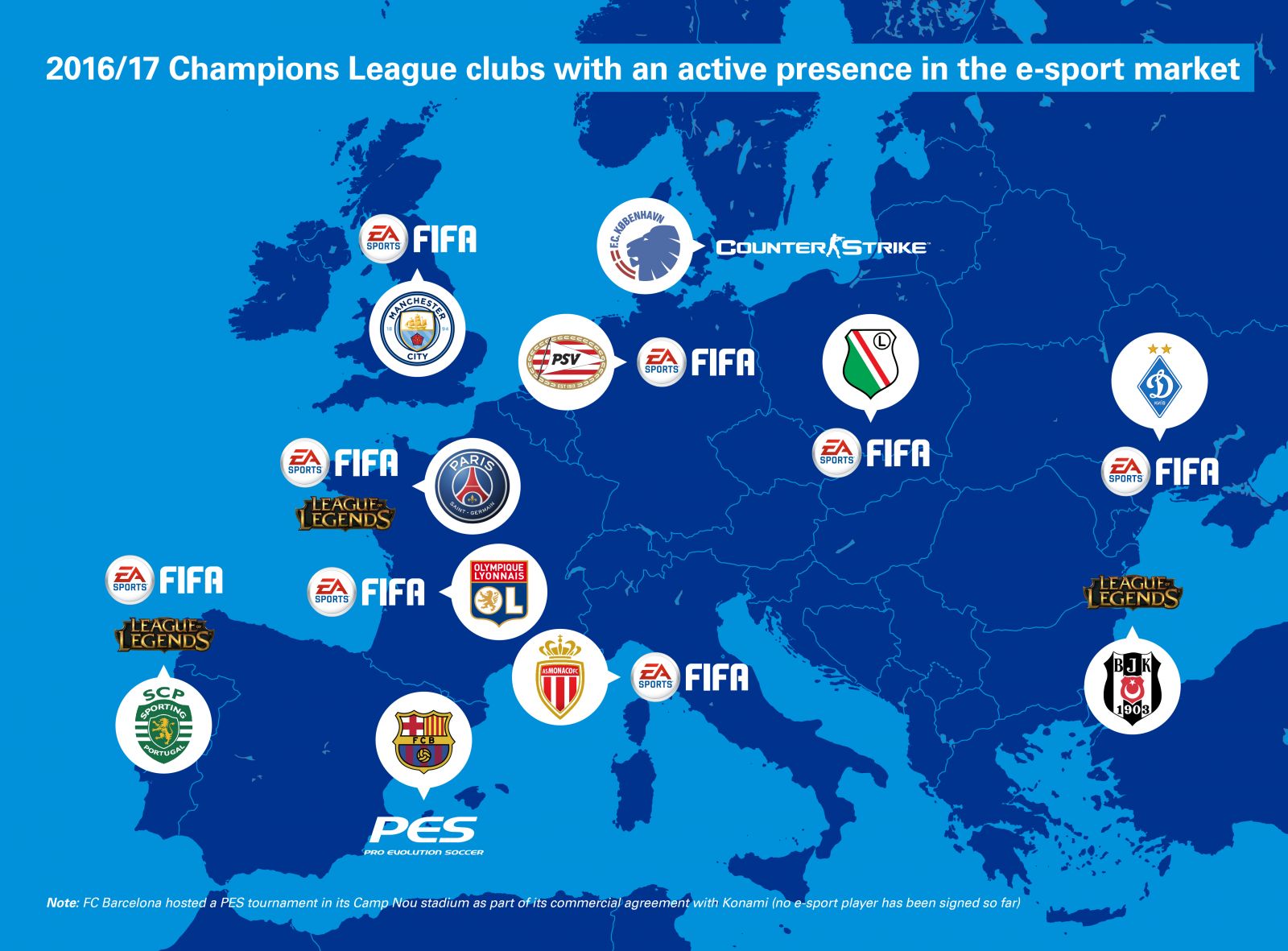FOOTBALL CLUBS AND E-SPORT: A MARRIAGE OF CONVENIENCE?
In their quest for broader audience and revenue stream diversification, football clubs´ latest move has been to step into the e-sport industry. E-sport – or professional competitive video gaming – represents a unique and relatively low-risk opportunity for clubs to associate their brand to a fast-growing and trending sector. As many clubs are taking the leap forward, KPMG´s Football Benchmark team looks into the nascent relationship between football clubs and e-sport.
Enhancing the club’s dynamic and up-to-date image towards the general public, involvement in e-sport increases the lifestyle element of a club’s brand. Moreover, e-sport is also an enabler to target a specific customer group: the young, active and social media savvy fans, especially from Asia, the region driving the growth of the e-sport market. Thus, as this group of fans mirrors the changing customers´ habits in consuming sports and entertainment, it seems a must for football clubs to cater to this segment by adapting their communication strategies.
Although the e-sport market provides revenue generation opportunities, ranging from sponsorship deals to prize money or licensing rights, at this early stage clubs seem to be focused on positioning themselves in the market to profit from future growth opportunities. Indeed, breaking into this relatively new market, football clubs have adopted different strategies in terms of which e-sport entity to primarily target and invest in.
In most cases, clubs have taken advantage of the natural connection with EA Sports´ most famous football video game, FIFA, signing professional e-sport FIFA players to represent the clubs in domestic and international gaming competitions. However, as FIFA, mainly followed by European customers, is still lagging behind non-football games in terms of online viewership, clubs such as Beşiktaş JK, FC Schalke 04, Sporting CP or Paris Saint- Germain FC have gone a step further and tied relationships with non-football video games, including the iconic League of Legends, Hearthstone and even the first-person shooter game Counter-Strike.

Moving into these non-football games enables the clubs to fully harness e-sport´s potential as the aforementioned are among the most popular video games across the world. However, this also requires higher investments (team acquisition costs, operational costs, salaries of players and training staff, etc.) and has led clubs to follow different paths. For example, Paris Saint-Germain FC and FC Schalke 04 have acquired well-established League of Legends teams competing in international renowned leagues, while others (e.g. Beşiktaş JK, Valencia CF and Sporting CP) are developing their teams in local League of Legends leagues.
However, unlike in traditional football competitions, clubs do not take the lion´s share in the current e-sport eco-system, where event-organizers, game publishers or digital platforms (e.g. the recently Amazon-acquired Twitch platform) enjoy natural connections after investing in the sector for several years. As a result, various European leagues have started to create structured competitions at national level such as, for example, the Orange e-Ligue 1, launched in October 2016 and broadcasted on beIN Sports, or the Dutch Eredivisie, which followed suit in January 2017.
In the fast growing e-sport market, as a result of the multiple games and competitions and less regulated environment, entry barriers are significantly lower than in traditional sports and clubs are still unfamiliar with the path towards a long-term success. Indeed, this might explain why some European historical strongholds such as Manchester United FC or Real Madrid CF, brands associated to competition at the highest level, have not yet entered this fast moving phenomenon.
As clubs continue to develop strategies to increase fan engagement and monetization, e-sport, although still far from becoming a significant revenue stream, provides a growth opportunity in the digital space, but whose size is still unknown. As customer habits change, the ultimate challenge will be to keep the young audience engaged with the game, however, if clubs manage to effectively integrate e-sport in the entertaining fan experience, there is little doubt the alliance will bear fruits in the future.
Further investigation into this and related topics, as well as analysis of industry data, can be undertaken for you by KPMG Sports Advisory Practice. Our subject matter experts can also assist stakeholders in assessing and interpreting the potential impact on their organizations of any particular piece of research, identifying the underlying reasons behind specific trends or developing potential solutions and considering future scenarios.


